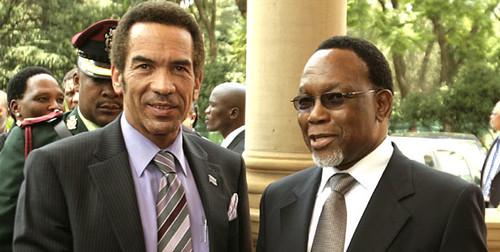
Botswana President Ian Khama (left) has been confirmed as the winner of the national elections. He is photographed here with South African Deputy President Kgalema Motlanthe, who is also the former interim president., a photo by Pan-African News Wire File Photos on Flickr.
What is Khama’s game plan?
Tuesday, 02 April 2013 00:00
Chrispa Chitova
The Botswana government recently said it would sanction Kenya’s President-elect, Uhuru Kenyatta, from entering the Southern African country until the International Criminal Court clears him on allegations of being the mastermind in electoral violence six years ago that led to more than 1 000 deaths.
Of course, senior government officials then fell over each other to retract that statement after President Seretse Khama Ian Khama had already made it evident to the world that presumption of innocence did not matter to him.
What is worrying is that such strange decisions have become a trend in Gaborone.
There was the matter of Sudan and President Omar al-Bashir, when President Khama broke ranks with an African Union decision on the value of the ICC warrant; there was the case of Zimbabwe when President Mugabe repeatedly went outside Sadc processes to air his personal — and bellicose — views; and there was the case of Libya when President Khama rushed to formally recognise the NATO-backed rebels who murdered Muammar Gaddafi.
Perhaps President Khama is trying to make it clear that he does not subscribe to the principles of unity and dialogue that are necessary for Africa’s advancement.
In 2008, the African Union adopted a resolution binding its members who are signatories to the Rome Statute — the founding text of the International Criminal Court — not to co-operate in apprehending Sudan’s President Omar al-Bashir. But the Botswana government, in 2009, contradicted this saying President al-Bashir would be arrested and taken to the ICC if he set foot in the country.
The statements were made by President Khama and his deputy, Mompati Merafhe.
In the same year, the Botswana government took a radical stance against Zimbabwe after that year’s elections. Gaborone said Harare should be barred from the counsels of the AU and Sadc because President Khama simply did not want President Mugabe to remain in power.
Confidential US diplomatic communications, which were made public by whistleblower website Wikileaks, indicated the Botswana government was covertly engaging the United States and that the country was willing to talk about hosting an American military base on its territory under the aegis of the much-maligned Africom.
According to one of the leaked communications, America’s Ambassador Katherine Canavan in October 2007, said Botswana was open to the possibility of violating Sadc and AU resolutions.
That was after Sadc and the AU had resoundingly declared that they would not allow any of their members to host Africom.
Only Botswana and Liberia were the willing hosts. In Liberia’s case, this is “understandable” as the government there is by and large an American proxy. Is President Khama saying his government is the same as Monrovia’s?
In August 2012, the former deputy secretary-general of South Africa’s ruling ANC, Thandi Modise, could not hold all this inside any longer and said: “Leaders want to host people who want to hurt us.
“They think as long as they can get funding from these Western people they are fine. But I can tell you that we are not happy at all.”
A 2008 communication from the US Embassy in Gaborone also indicated that Botswana wanted arms of war and other military equipment to help prepare for what the then deputy commander of the Botswana Defence Forces, Major-General Gobuamang Tlhokwane, said was an anticipated attack by Zimbabwe.
The document says Maj-Gen Tlhokwane approached a defence co-operation official at the US embassy in Botswana on July 14, 2008, and claimed Zimbabwe had massed military forces on their border.
He is said to have asked for global positioning systems, anti-tank missiles, short range air defence systems, and F5 under-wing tank system and helicopter gunships.
Any reasonable person will tell you that the last thing on Zimbabwe’s mind in 2008 was a war, moreso with a fellow Sadc country.
So why would this military chief request weapons and use Zimbabwe’s name in the same breath?
Botswana is also reported to have approached the US to send troops to guard a transmission station used by a pirate radio station, the Voice of America’s Studio 7, to broadcast its hate language and anti-Mugabe propaganda into Zimbabwe. There is a need for much soul-searching in and by Gaborone.
Furthermore, there is a need for Sadc and AU leaders to engage President Khama more and find out what his real problem is because on the present course, not much regional and continental integration can be achieved.
A former Dean of Social Sciences at the Midlands State University in Zimbabwe says,
“The sad thing about Botswana’s foreign policy stance is that it undermines Africa’s sovereignty, stability and solidarity.
“There is a value system that has been set by the Sadc region and the African continent.
“The moment you find a country within that region and that continent espousing Western interests ahead of the region or the continents’ interests then you know there is a problem.
"The Botswana government has on several occasions undermined the collective positions of Sadc and the AU. These two organs should look into the relevance of Botswana because it is bringing discord to the African Union and Sadc principles.”
Dr Charity Manyeruke — an international relations expert at the University of Zimbabwe — adds: “Khama has a lot of links with Western powers maybe because he was born in Britain where his father lived for a long time . . . “The African Union and Sadc should stop behaving as if they are sponsored by Botswana. They should confront Botswana and thrash these issues out.”
— Southern Times.
No comments:
Post a Comment